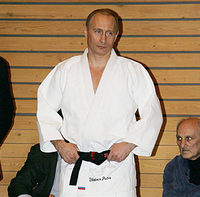During a three-day visit to Japan last week, Russian Prime Minister Vladimir Putin pushed commercial deals and received an honorary degree from Tokyo University for his efforts to improve Russian-Japanese ties (as well as for his knowledge of judo, in which he holds a black belt). But as expected, the Russian and Japanese governments made little progress in resolving their territorial dispute over four islands that Russia seized from Japan at the end of World War II. The dispute over the islands -- the Russians call them the Southern Kurils, while the Japanese refer to them as their Northern Territories -- has stood in the way of a formal peace treaty between the two countries since the end of hostilities more than 60 years ago. During his visit from May 11-13, Putin restated Russia's interest in negotiating a bilateral peace agreement. But he stressed that the actual discussions would be conducted by President Dmitry Medvedev with Japanese Prime Minister Taro Aso at this July's G-8 summit in Italy. Instead, Putin made business and energy the focus of his trip, and he did not leave empty-handed. The high point was the signing of a 25-year, bilateral, civil nuclear energy cooperation agreement that Russia and Japan had been negotiating for the past several years. The new accord between Russia's State Atomic Energy Corporation (Rosatom) and Japan's Ministry of Economy, Trade and Industry will replace an earlier bilateral agreement signed in 1991 that focused primarily on joint research. When ratified by the legislatures of both countries, the deal will establish a framework in which Russian and Japanese companies can reach specific deals to exchange peaceful nuclear power technologies, sell nuclear services, and enter into joint business ventures.
Global Insights: Putin’s Nuclear Judo in Tokyo

